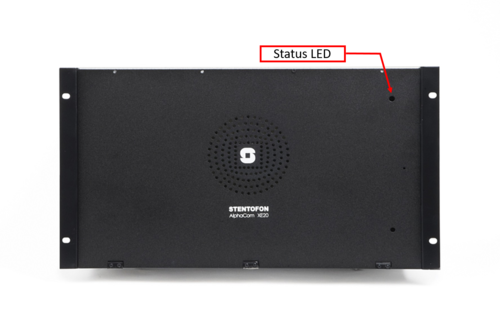Difference between revisions of "Status LED"
From Zenitel Wiki
| (9 intermediate revisions by 2 users not shown) | |||
| Line 1: | Line 1: | ||
| − | [[Image: | + | {{A}} |
| − | The [[status LED]] indicator is located in front of the [[AlphaCom | + | [[Image:ACXE20 StatusLED.png|thumb|500px|Status indicator LED in AlphaCom XE20]] |
| − | * System startup: Red -> Amber -> Green light | + | The [[status LED]] indicator is located in front of the [[AlphaCom XE20]] and [[AlphaCom XE26]] cabinet. The status LED is steady green when all is in order. An error situation is indicated by flashing red light: |
| − | * Board error: Red light. The [[AMC-IP]] board can no longer find one or more boards in the exchange. Could be due to a faulty board, or that a board has been moved to another position or removed. A board error in a slave module in a [[MultiModule]] system is reported on the LED of the master module, the LED in slave module will not indicate board error. | + | * '''System startup''': Red -> Amber -> Green light |
| − | * [[MultiModule]] communication error: | + | * '''Board error''': Red light. The [[AMC-IP]] board can no longer find one or more boards in the exchange. Could be due to a faulty board, or that a board has been moved to another position or removed. A board error in a slave module in a [[MultiModule]] system is reported on the LED of the master module, the LED in slave module will not indicate board error. |
| + | * '''[[MultiModule]]''' communication error: | ||
**Master module: Red light if the master module has lost contact with the slave(s) | **Master module: Red light if the master module has lost contact with the slave(s) | ||
**Slave module(s): If a slave has lost contact with the master module, the LED in the slave will light steady amber while the slave is rebooting, then the LED goes green when the module has come up in autonomy mode | **Slave module(s): If a slave has lost contact with the master module, the LED in the slave will light steady amber while the slave is rebooting, then the LED goes green when the module has come up in autonomy mode | ||
| − | * [[RCI|Remote Control Input]] (RCI): Red light when the RCI is active. Requires software configuration from [[ | + | * '''[[RCI|Remote Control Input]] (RCI):''' Red light when the RCI is active. Requires software configuration from AlphaPro, [[Exchange_%26_System_%28AlphaPro%29#Inputs|Exchange & System > RCI]]. Set the flag "Activate Faulty Module LED". |
| − | The | + | The exchange status and status indicator LED can be reset by dialling the code [[Reset_Board_Error_Indication_feature|7871]] from a [[SuperUser]]. |
[[Category: AlphaCom features]] | [[Category: AlphaCom features]] | ||
Latest revision as of 13:01, 1 June 2018
The status LED indicator is located in front of the AlphaCom XE20 and AlphaCom XE26 cabinet. The status LED is steady green when all is in order. An error situation is indicated by flashing red light:
- System startup: Red -> Amber -> Green light
- Board error: Red light. The AMC-IP board can no longer find one or more boards in the exchange. Could be due to a faulty board, or that a board has been moved to another position or removed. A board error in a slave module in a MultiModule system is reported on the LED of the master module, the LED in slave module will not indicate board error.
- MultiModule communication error:
- Master module: Red light if the master module has lost contact with the slave(s)
- Slave module(s): If a slave has lost contact with the master module, the LED in the slave will light steady amber while the slave is rebooting, then the LED goes green when the module has come up in autonomy mode
- Remote Control Input (RCI): Red light when the RCI is active. Requires software configuration from AlphaPro, Exchange & System > RCI. Set the flag "Activate Faulty Module LED".
The exchange status and status indicator LED can be reset by dialling the code 7871 from a SuperUser.

